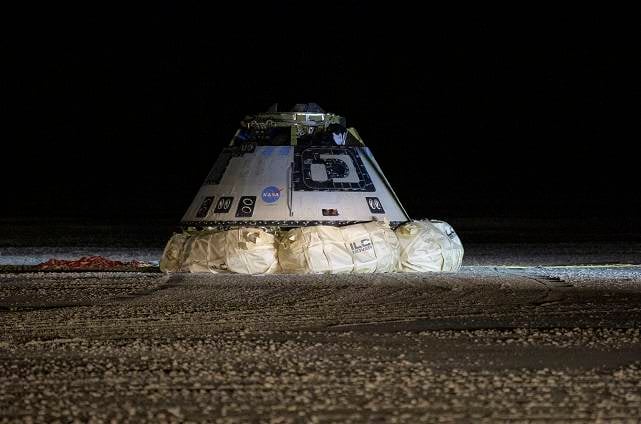
Making lemonade out of lemons with Calypso
Boeing's borked capsule, the CST-100 Starliner, successfully returned to Earth yesterday while engineers scrambled to work out what went wrong, and managers rushed to justify the truncated mission.
The capsule triumphantly, and finally, left the Earth on Friday morning atop an Atlas V. However, things went badly wrong for the cone-shaped spacecraft after just over 30 minutes, following separation from Centaur second stage. A borked Mission Elapsed Timer meant the spacecraft thought it was further ahead in the mission than it actually was, and Starliner burnt through its attitude control fuel before getting anywhere near the International Space Station (ISS).
In a briefing following the landing, Boeing's Jim Chilton revealed just how far out of whack the clock had got - 11 hours. Exactly how this happened remains unclear at this early stage; the clock is set from data slurped from the Atlas V ahead of lift-off, but in this instance Starliner grabbed the wrong information, something not picked up by horrified techs until it was too late.
Of course, had the mission gone to plan, the CST-100 Starliner would not have spent a huge amount of time alone in orbit anyway. Once docked with the ISS, the plan had called for the capsule to be mostly powered down until it was time to return to Earth.
That docking never happened, meaning (even to the layman) the Starliner did not achieve all the goals of the Orbital Flight Test mission. In the briefing, Chilton said he reckoned that the team were in the "low 60s" in terms of percentage of mission goals at first glance. However, he went on to say, once all the data had been retrieved following the capsule's return to Florida "we're probably in the 85 to 90 per cent range of our test objectives."
Impressive, seeing as the ISS wasn't troubled by the presence of Boeing's baby.
Chilton also called out how pristine the capsule looked following its 1258 UTC landing at White Sands in New Mexico on 22 December. Unlike the SpaceX Dragon capsule, the Starliner comes back to dry land, with airbags cushioning the capsule's impact. Also unlike SpaceX's scorched capsule, the Starliner also appeared remarkably unscathed by re-entry, much like the Space Shuttle of old.
Former Space Shuttle Program Manager, Wayne Hale, observed that the landing occurred on the same runway as STS-3, back in March 1982.
Dubbed Calypso by astronaut Suni Williams (after the Jacques Cousteau ship rather than the lemon-based drink), Boeing and NASA were tight-lipped on when the capsule would fly again with a crew onboard (including Williams.)
Should the agency decide that it really needs to see that capsule do a docking before shoving humans into it, Chilton reckoned that it would likely take a minimum of "three months" to turn things around.
Boeing will, however, take solace from NASA boss Jim Bridenstine, who rounded out the post-landing briefing with "we have a solid understanding of the challenge that we had and why it occurred, and it's not something that is going to prevent us from moving forward quickly."
If NASA and Boeing elect to proceed as planned, the just-landed capsule will host the first crewed mission to the ISS from US soil (following the retirement of the Space Shuttle) in 2020. ®
Sponsored: M3 - The ML, AL and Analytics Conference from The Register
Bagikan Berita Ini














0 Response to "Starliner: Boeing, Boeing... it's back! Borked capsule makes a successful return to Earth - The Register"
Post a Comment